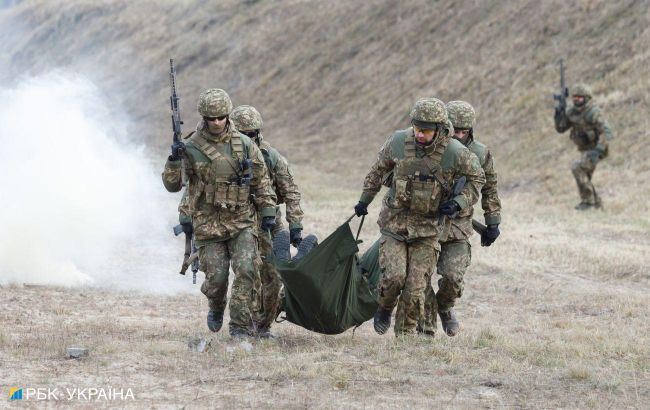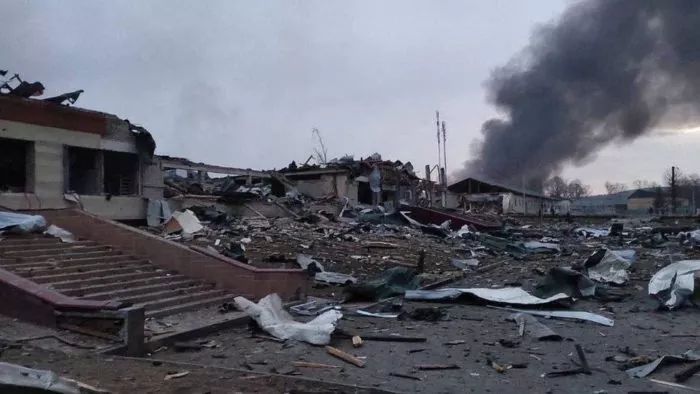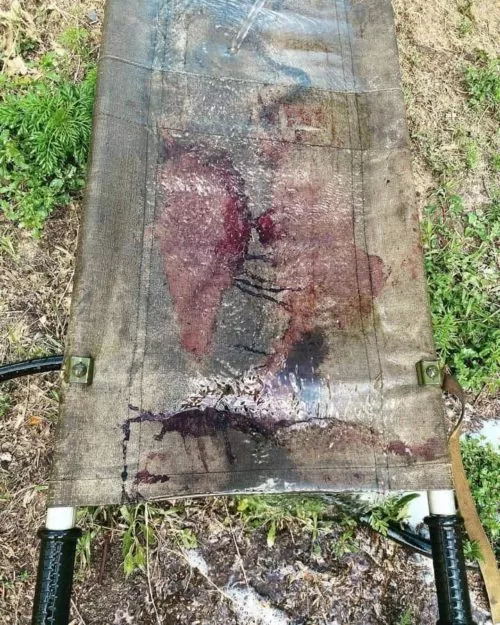The husband of Ukrainian poet Olena Iskova-Myklaschuk was at the Yavoriv military ground when Russian missiles struck the barracks. He, like many other survivors, refuse to talk about it, but when he remembers, he repeats his story incessantly, moving from the world of the living to the the realm of the dead.

Ukrainian fighter Ivan (name changed) was at the Yavoriv military base when it was attacked by Russian forces on 13 March, 2022. The base is located less than 15 miles from the border with Poland. According to Ukrainian officials, the military facility was hit by 30 Russian missiles, and more than 40 Ukrainian soldiers were killed and 134 others were injured. The Kremlin announced that “180 foreign mercenaries were killed.” The International Legion for Defense of Ukraine denied that foreign fighters had been killed.
Olena Iskova-Myklaschuk is a writer and poet from Verbivtsi, Khmelnytsky Oblast. After the Russian missile attack on Yavoriv, Olena travelled there to see her soldier husband. The men and women who survived the attack refuse to talk about it. But her husband speaks incessantly, and Olena listens. As soon as he remembers, his eyes become blank and colourless; he begins to tell his story, and when he finishes, he starts again.
(Not recommended reading for the faint of heart)
I am a ghostly “200”… That’s my official designation. I have the document to prove it.
And yet, here I am. I move about, I eat, and I sleep. Just a few hours ago I went looking for a little stream where I could wash up. The water was too cold; the temperature was hovering around the freezing point. And me, having to sleep outdoors instead of in a much more familiar and comfortable environment, a normal bed. The result is that I’m sick, with a bad cough and a 39-degree fever.
Ukrainian fighter Ivan – I’m a ghostly “200”
This year, the month of March wasn’t very warm, which is understandable since winter is in everyone’s heart and soul. While the date on my mobile dutifully changes from one day to the next, the calendar has become irrelevant: in our hearts, it’s constantly 24 February, 2022.
The commander notices my pitiful appearance and calls me over. I walk towards him and report for duty. He seems worried and comments on my black humour. I present my military documents, which constitute my only possession after the missile strike on our training base and, of course, I still have the clothes I’m wearing. All my other possessions were completely consumed in the fire. The commander checks and double checks my documents. I’m definitely a “200.”

“Have you at least phoned your family? What about your arms and legs? Haven’t they already been shipped off in a coffin? Listen, you should claim your earthly remains. Sign here. But I’d advise against opening your coffin, because there’s literally only one arm and one leg… not necessarily from the same person either…” he says loudly.
Death from the sky
“Danger! Danger!” The air raid alert sounded in response to a new attack of an incoming cruise missile. “Wake up! Alarm!”
“Get lost with your alarm,” Tolian complains and turns over onto his other side and quickly begins snoring again, so loudly that no one else can sleep.
“Alarm, you say? But we’re far behind the lines. The only explosions here are in war movies,” I say, but Vadik and I in the company of German reluctantly agree to leave the building and exit onto the street.
The cold spring air gets under my skin, so recently warmed by the heat of the pot belly stove, near which I was sleeping. We blow into our hands to warm them up and reach for cigarettes. No one wants to talk, so we simply walk a little faster.
“What? How can there possibly be an air alert out here?” asks German as he inhales deeply, shivering from the cold. “I don’t know about you, but I’m not easily fooled. I’m going to the bathroom and then back to bed.”
Meanwhile, the drone of an airplane engine grows louder and louder. To be honest, I’d never heard such a sound in my life. By now, I could distinguish the sound of many different sized artillery shells, but this time I confused the incoming missile with an airplane. By the time I turned my head in its direction, my legs were already fleeing the scene. Even though I’d started smoking two packs of cigarettes a day since 2014 when the war began, I was still able to move quickly. No daily exercise routine can provide your body with that strength and endurance which comes from the dawning comprehension that your demise is flying straight at you.
“Ah for fuck’s sake,” I swear out loud, as I trip over a metal obstacle and fall into a shallow crater. The missile smashes into the ground ten metres from me, creating a vacuum and sucking the air towards it, like a giant magnet mercilessly pulling everything in its vicinity. I feel like a metal drill piece struggling against the laws of nature. An invisible power is tugging at my legs. I reflexively grab onto anything beside me, scratching at stones with my fingernails in a futile effort to hold on to something. It isn’t long before I’m torn away, along with a clump of yellowed grass to which I’m still clinging.
“It won’t be long now,” I think, as my body lunges into the air.

The blast
The detonator winds down and the rocket explodes, like a party ball filled with glitter, but with deadly force, scattering fragments of torn body parts in all directions, consuming everyone in flames: all those who were sleeping peacefully, as well as those running to higher ground, but who couldn’t escape in time.
I light a cigarette. My body is frozen with fear and the thought: “Will there be a second one?” I take several deep drags.
Inhale – exhale. Inhale – exhale. Something like a switch clicks within my head: “No, it’s OK, there won’t be another one…”
The aftermath
I stand up. My head is buzzing. Beside me there are bodies: one, two, three, four “200s.”
“Over here! Help me get up! For some damn reason I can’t move, and we must hurry to help the others,” shouts a young man.
“Your leg’s broken,” I exclaim to a man, who’s pulling himself along by his pant leg.
“It isn’t slowing me down. I’ve just walked twenty metres on it.”
Another man asks for a cigarette. As he smokes, ashes flake down onto his body. He screams that they’re burning his skin. I dust the ashes off his jacket and notice his legs. They are black, scorched from the fire. He doesn’t feel any pain, but he does feel the tiny sparks that fall onto his neck.
“My back! Ouch, my back hurts!” Yet another man turns to me, asking me to take a look and see what’s wrong. Where his back used to be there is now a black hole. I light a cigarette for him and lead him to the doctors. They take one look at us and quickly divert their gaze. They know that the man I’m helping is already a “200.”
Headless bodies lie on the grounds of our barracks. I shudder at the sight. It’s a hellhole, enough to make one’s head spin. We treat the burns with salve and carry the wounded to the ambulances. Along our path we see “mannequins”, burnt corpses suspended in poses they were in when they met their death.
Other bodies are erect. And barefoot. I’ve learned from experience that if an explosion removes the shoes someone’s wearing, then they are beyond help, and first aid measures are useless.
One… two… three… ten. I lose count.
So we begin counting only those who are alive.
A new morning dawns in striking colours of dark red, mixed with blood; the air is dulled with ashes and filled with desperate cries and last dying breaths.

Another psychologist might look at me disinterestedly and ask me the question I’ve heard a hundred times before – whether I’ve suffered a contusion.
My answer is as before, “No. I’m a ghostly “200.”
Read more:
- Meet the Ukrainian university professor who gives lectures from the trenches
- “Ukraine has no choice but to fight. Sorry, European oligarchs.” Security expert Samus on western military aid and outcome of war
- Russia must not get another “Minsk agreement” in Ukraine
- On the verge of despair yet waiting for liberation: life in Kherson Oblast after Russian occupation
- What NATO should do
- Ukrainian poet Halyna Kruk: “War is not a metaphor”
- Ukrainian man climbs out of grave after being shot by Russians




